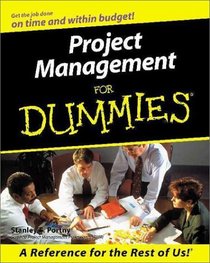Search -
Project Management for Dummies
Project Management for Dummies
Author:
Projects have been around since ancient times. Noah built the ark, Leonardo da Vinci painted the Mona Lisa, Jonas Salk developed the polio vaccine – all projects. Why then, is the topic of project management suddenly of such great interest today? The answer is simple. The audience has changed and the stakes are higher. S... more »
Author:
Projects have been around since ancient times. Noah built the ark, Leonardo da Vinci painted the Mona Lisa, Jonas Salk developed the polio vaccine – all projects. Why then, is the topic of project management suddenly of such great interest today? The answer is simple. The audience has changed and the stakes are higher. S... more »
ISBN-13: 9780764552830
ISBN-10: 076455283X
Publication Date: 1/15/2000
Pages: 350
Rating: 3
ISBN-10: 076455283X
Publication Date: 1/15/2000
Pages: 350
Rating: 3
2.7 stars, based on 3 ratings
Genres:
- Business & Money >> General
- Business & Money >> Management & Leadership >> Management
- Business & Money >> Management & Leadership >> Planning & Forecasting
- Business & Money >> Business Development & Entrepreneurship >> Entrepreneurship




